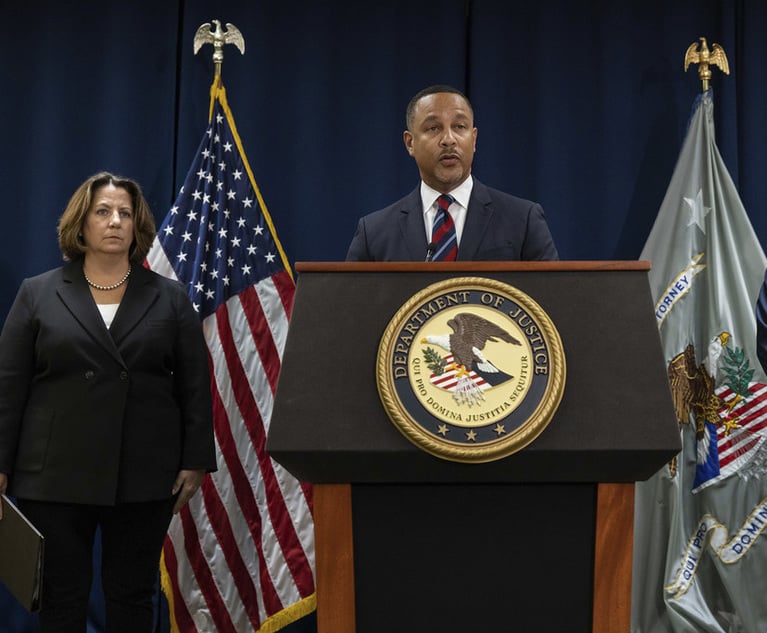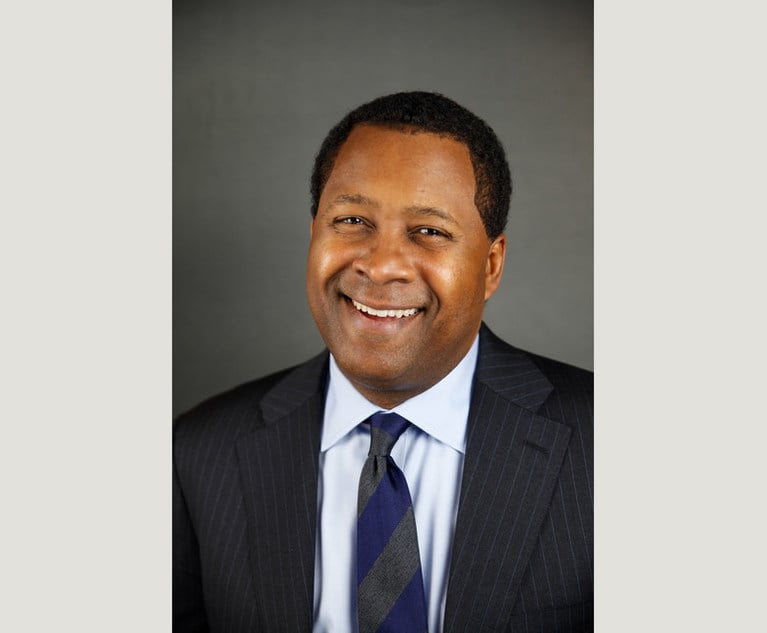Compliance Hot Spots: CFIUS Changes in Focus | How Law Firms Are Prepping for Midterms | Giant List of Moves | Plus: Who Got the Work
The CFIUS review process is getting lots of attention right now, and we've got some observations from leading practitioners about what to expect. Plus: the latest compliance and enforcement headlines give a peek into what law firms are thinking about as the midterms fast approach. Thanks for reading Compliance Hot Spots.
October 23, 2018 at 09:00 PM
10 minute read
Welcome to Compliance Hot Spots. The federal panel that conducts national security reviews for foreign investments is widening its aperture and will soon review a broader swath of deals that touch critical U.S. technology. The new process—and workload for the Committee on Foreign Investment in the U.S.—could bring new delays even to deals that don't raise concerns about the national security. Scroll down for the latest moves, compliance headlines and our regular feature Who Got the Work.
As always thanks for reading—and please do send feedback. I appreciate hearing from you about what's on your plate—observations, trends, new clients. I'm at [email protected] and 202-828-0315, or follow me on Twitter @cryanbarber.
'Pressure Within the System': CFIUS in Focus
For three decades, the federal government's national security reviews of foreign investments have been limited to deals that involve controlling stakes in a U.S. companies. And foreign investors haven't been required to disclose their planned deals to the interagency panel tasked with conducting those reviews, the Committee on Foreign Investment in the U.S. That all changes on Nov. 10.
Under a pilot program launching next month, CFIUS will begin requiring short-form notices of foreign investments involving critical technology in 27 industries, including defense, telecommunications and metal production. The penalty for failing to disclose is potentially steep: Up to the value of the proposed transaction.
Naturally, it's creating plenty of work for lawyers.
The pilot program, prompted by a new law tightening reviews of foreign investments, could bring an unprecedented number of transactions under the purview of CFIUS. The committee is supposed to take action within 30 days of receiving a declaration. That action could include requesting more information, initiating a formal review of the deal or indicating that it does not plan to take further steps.
Goodwin Procter's Richard Matheny is waiting for the dust to settle: “I liken the pilot program to a mortar round launched into your practice group. It exploded and there's rubble and dust everywhere and your ears are ringing and you're not sure if you're bleeding,” he told my colleague Phillip Bantz recently. “What I've tried to do is calm the ringing in the ears and help people understand what this means.”
What to watch: With so much coming onto its plate, CFIUS may struggle to quickly clear deals that don't raise national security concerns. That could slow down deals that, in many cases, need to move quickly.
“The amount of work that has to go into it is going to create pressure within the system. That whole dynamic in turn creates some uncertainty. And in a transaction process, in an M&A process, the things that matter are timing and certainty,” said Covington & Burling partner David Fagan, who helped Lenovo secure CFIUS approval for its $2.1 billion acquisition of the x86 server business from IBM.
Fagan tells me: “Into this process now you're creating uncertainty on timing and you're creating uncertainty on exactly how it's going to work. I think for everybody there's going to be a 12 to 24 month process at least where it could be painful.”
The pilot program is causing lawyers to consider national security even earlier in the dealmaking process—and take steps to head off concerns the Treasury Department-led committee might raise.
“Previously, we would have had more work than people would anticipate on transactions being tossed around. The pre-transaction stage has always been a key part of the practice, but a lot of the work has been on the execution side: pursuing the filing, grappling with CFIUS issues, dealing with mitigation and the like. I think a macro thing that's going to happen here is there's going to be a lot more work on the front end, at least in the near term, thinking through these issues,” Fagan says.
Who Got the Work
>> A team from Hogan Lovells—including former U.S. Sen. Norm Coleman—pulled in nearly $700,000 from ZTE between June and September, according to a new lobbying disclosure. Hogan Lovells had been hired in the prior quarter to help lift a seven-year ban on U.S. exports to ZTE—a move that posed an existential threat to the Chinese telecom giant. ZTE paid Hogan Lovells nearly $1.3 million between April and June, according to a disclosure filed for the second quarter.
>> Jones Day partner Joan McKown is joining the newly formed task force led by Preet Bharara, the former Obama-era U.S. attorney for the Southern District of New York. Bharara and SEC Commissioner Robert Jacksonannounced the task force in a New York Times op-ed a couple of weeks ago. The news site Axios wasn't bullish that the task force will see much fortune in its effort to push new insider trading protocols: “If Bharara does come up with proposed legislation, it's hard to see why it should fare better than any of the bipartisan bills that have failed in the past. America's traders don't like fetters—and they have very good lobbyists.”
>> An Ohio federal judge has denied Jones Day more than $1.2 million in legal fees for its representation of Weltman, Weinberg & Reis Co. L.P.A. in an action brought by the Consumer Financial Protection Bureau. The debt collection firm prevailed at trial. “From its start, this case has been an abuse of the Bureau's power,” Jones Day lawyers wrote in their petition for fees. “What the bureau did not find was any instance in which any consumer was harmed, any consumer was misled, or any consumer was confused by any of Weltman's collection practices.”
>> Lawyers from the Washington appellate boutique Donahue, Goldberg & Weaver—including former U.S. Supreme Court clerks Susannah Weaver and Sean Donahue—are seeking $300,000 in legal fees from the EPA following a successful challenge to a Trump-led deregulatory effort. Here's a link to the fee petition in the D.C. Circuit. Weaver formerly was an associate at Orrick, Herrington & Sutcliffe, where she billed $705 hourly in 2016.
Compliance Reads: How Law Firms Are Prepping for US House Switching Control
“Washington law firms are preparing for a boom in business from a projected Democratic takeover of the House in 2019, anticipating that pharmaceutical, tech and oil and gas companies will need help navigating a flurry of oversight investigations,” Politico reports.
Rafi Prober, a partner at Akin Gump Strauss Hauer & Feld described a “ton of pent-up investigative activity and interest in the Hill.” Covington & Burlingpartner Robert Kelner told Politico that his firm industry-specific memos to clients advising on potential hot spots. Steptoe & Johnson LLP partner Matthew Herrington said: “Winter is coming.” More headlines that caught my eye…
>> “A group of former analysts at the U.S. Treasury Department launched a firm that uses research and data analytics to help companies and banks with sanctions-related risk,” The Wall Street Journal reports. The firm, Kharon, has 50 employees across D.C, New York and Los Angeles.
>> The Federal Trade Commission has been holding hearings about the swelling power of tech giants such as Google, Amazon and Facebook. “But there's a problem,” Fast Company reports. “The FTC organized these hearings so that Simons and the public would be hearing from many economists who have taken money, directly or indirectly, from giant corporations.” Davis Polk & Wardwell partner partner Howard Shelanski, for instance, questioned whether there's justification for antitrust enforcers to curtail tech giants' market power. His firm's client roster includes Facebook and Comcast.
>> To disclose or not to disclose? With the Treasury Department's Office of Foreign Assets Control, as with other federal agencies, it's complicated. Joanna Ritcey-Donohue of JRD Law PLLC in Washington has a piece in Corporate Counsel going through some of the factors companies have to weigh when they discover sanctions violations. “On the Why Not side,” she writes, “there are substantial reasons companies may opt not to disclose in a particular situation. For instance, any disclosure to the US government potentially exposes a company to more scrutiny than bargained for, such as in the form of informal or formal information requests, or even subpoenas.”
>> Running the show at the CFPB: “Everyone's eyes are on [Mick] Mulvaney and [Kathy] Kraninger but it's Brian Johnson who is pulling the levers behind the curtain,” Karl Frisch, executive director of the consumer advocate Allied Progress, told The Wall Street Journal. “He is kind of the Wizard of Oz.”
>> “A former compliance officer at UBS, Fabiana Abdel-Malek, will stand trial this week in London on 10 counts of insider trading,” the Financial Times reports. Why this case is getting attention: “Much is at stake for the [Financial Conduct Authority], which is the UK's main fighter of insider trading. The agency has a record number of cases of the crime that it is investigating, with 87 live cases, according to its most recent data.
>> Neomi Rao, a chief architect of the Trump administration's deregulatory agenda, writes in a Washington Post op-ed: “The administration's reform agenda focuses on unleashing the freedom of American workers, innovators and businesses. We are pushing back the expansion of the administrative state, which has too often imposed immense regulatory costs without any benefit.”
Notable Moves and New Hires
>> Ronald Tenpas, formerly at Morgan, Lewis & Bockius, has joined the Washington office of Vinson & Elkins. From 2007 to 2009, Tenpas was the assistant attorney general at the U.S. Justice Department in charge of the environment and natural resources division.
>> White-collar defense boutique Morvillo Abramowitz Grand Iason & Anello is adding Telemachus “Tim” Kasulis, who was most recently co-chief of the securities and commodities fraud task force at the U.S. Attorney's Office for the Southern District of New York. Kasulis will join Morvillo Abramowitz as a partner, effective January 2019. The move was the firm's first partner hire in three years.
>> Gary Goldsholle has returned to Steptoe & Johnson LLP as a partner in Washington, after more than two decades away from the firm. Goldsholle was most recently at the U.S. Securities and Exchange Commission, where he served as a deputy director in the agency's division of trading and markets.
>> Norton Rose Fulbright has hired compliance and regulatory partner Jeffrey Cottle from Steptoe & Johnson. The firm said Cottle will split time between the U.S. and Europe.
>> Former in-house lawyer Judy Wong has left Ernst & Young to serve as top attorney for the Hong Kong-based business advisory and services company Tricor Group.
>> David Medlar has joined Ballard Spahr's consumer financial services group as counsel in Washington. Medlar previously was at Morrison & Foerster. Chris Ford joined Ballard Spahr from Morrison & Foerster in August as partner. Ford chaired his previous firm's global outsourcing group.
>> Eric Sussman joins the Chicago office of Reed Smith as a partner in the global regulatory enforcement practice. Sussman formerly was deputy chief in the financial crimes and special prosecutions unit of the U.S. attorney's office for the Northern District of Illinois.
>> Sean Hayes, the director of oversight at the Department of Health and Human Services, is joining the congressional investigations practice at Wilmer Cutler Pickering Hale and Dorr. Hayes was previously deputy chief of oversight for the House Energy and Commerce Committee. His hiring comes as law firms stock up on talent in advance of an expected surge in congressional investigations.
As always thanks for reading—and please do send feedback. I appreciate hearing from you about what's on your plate—observations, trends, new clients. I'm at [email protected] and 202-828-0315, or follow me on Twitter @cryanbarber.
This content has been archived. It is available through our partners, LexisNexis® and Bloomberg Law.
To view this content, please continue to their sites.
Not a Lexis Subscriber?
Subscribe Now
Not a Bloomberg Law Subscriber?
Subscribe Now
NOT FOR REPRINT
© 2024 ALM Global, LLC, All Rights Reserved. Request academic re-use from www.copyright.com. All other uses, submit a request to [email protected]. For more information visit Asset & Logo Licensing.
You Might Like
View All
Compliance Hot Spots: GOP Eyes ESG as an Antitrust Issue + Another DOJ Crypto Seizure + Sidley Partner Jumps to Main Justice
9 minute read
Compliance Hot Spots: Lessons from Lafarge + Fraud Section Chief Talks Compliance + Cravath Lands FTC Commissioner
11 minute readTrending Stories
- 1'Largest Retail Data Breach in History'? Hot Topic and Affiliated Brands Sued for Alleged Failure to Prevent Data Breach Linked to Snowflake Software
- 2Former President of New York State Bar, and the New York Bar Foundation, Dies As He Entered 70th Year as Attorney
- 3Legal Advocates in Uproar Upon Release of Footage Showing CO's Beat Black Inmate Before His Death
- 4Longtime Baker & Hostetler Partner, Former White House Counsel David Rivkin Dies at 68
- 5Court System Seeks Public Comment on E-Filing for Annual Report
Who Got The Work
Michael G. Bongiorno, Andrew Scott Dulberg and Elizabeth E. Driscoll from Wilmer Cutler Pickering Hale and Dorr have stepped in to represent Symbotic Inc., an A.I.-enabled technology platform that focuses on increasing supply chain efficiency, and other defendants in a pending shareholder derivative lawsuit. The case, filed Oct. 2 in Massachusetts District Court by the Brown Law Firm on behalf of Stephen Austen, accuses certain officers and directors of misleading investors in regard to Symbotic's potential for margin growth by failing to disclose that the company was not equipped to timely deploy its systems or manage expenses through project delays. The case, assigned to U.S. District Judge Nathaniel M. Gorton, is 1:24-cv-12522, Austen v. Cohen et al.
Who Got The Work
Edmund Polubinski and Marie Killmond of Davis Polk & Wardwell have entered appearances for data platform software development company MongoDB and other defendants in a pending shareholder derivative lawsuit. The action, filed Oct. 7 in New York Southern District Court by the Brown Law Firm, accuses the company's directors and/or officers of falsely expressing confidence in the company’s restructuring of its sales incentive plan and downplaying the severity of decreases in its upfront commitments. The case is 1:24-cv-07594, Roy v. Ittycheria et al.
Who Got The Work
Amy O. Bruchs and Kurt F. Ellison of Michael Best & Friedrich have entered appearances for Epic Systems Corp. in a pending employment discrimination lawsuit. The suit was filed Sept. 7 in Wisconsin Western District Court by Levine Eisberner LLC and Siri & Glimstad on behalf of a project manager who claims that he was wrongfully terminated after applying for a religious exemption to the defendant's COVID-19 vaccine mandate. The case, assigned to U.S. Magistrate Judge Anita Marie Boor, is 3:24-cv-00630, Secker, Nathan v. Epic Systems Corporation.
Who Got The Work
David X. Sullivan, Thomas J. Finn and Gregory A. Hall from McCarter & English have entered appearances for Sunrun Installation Services in a pending civil rights lawsuit. The complaint was filed Sept. 4 in Connecticut District Court by attorney Robert M. Berke on behalf of former employee George Edward Steins, who was arrested and charged with employing an unregistered home improvement salesperson. The complaint alleges that had Sunrun informed the Connecticut Department of Consumer Protection that the plaintiff's employment had ended in 2017 and that he no longer held Sunrun's home improvement contractor license, he would not have been hit with charges, which were dismissed in May 2024. The case, assigned to U.S. District Judge Jeffrey A. Meyer, is 3:24-cv-01423, Steins v. Sunrun, Inc. et al.
Who Got The Work
Greenberg Traurig shareholder Joshua L. Raskin has entered an appearance for boohoo.com UK Ltd. in a pending patent infringement lawsuit. The suit, filed Sept. 3 in Texas Eastern District Court by Rozier Hardt McDonough on behalf of Alto Dynamics, asserts five patents related to an online shopping platform. The case, assigned to U.S. District Judge Rodney Gilstrap, is 2:24-cv-00719, Alto Dynamics, LLC v. boohoo.com UK Limited.
Featured Firms
Law Offices of Gary Martin Hays & Associates, P.C.
(470) 294-1674
Law Offices of Mark E. Salomone
(857) 444-6468
Smith & Hassler
(713) 739-1250














